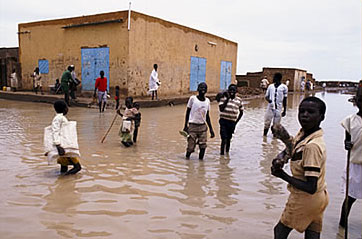It was not an easy life. But for fisherman Mohammadu Bello and his nine children the shallow waters of Lake Chad, a vast body of fresh water at the intersection of Niger, Chad, Nigeria and Cameroon, at least provided a living. Sales of lake catfish were brisk at the Doron Baga fish market, sustaining his family. But no more. Over the past 30 years the lake has steadily retreated from its former shores, leaving Mr. Bello and his neighbours high and dry and raising the prospect that the lake — once one of Africa’s largest — could vanish entirely. “Some 27 years ago when I started fishing on the lake,” he told the British Broadcasting Corporation in January, “we used to catch fish as large as a man.” Now, he said, the fish are small and what little is available is trucked into the market over the dry lakebed.
The causes of the lake’s shrinking, say scientists and researchers, include its increased use for irrigation and drinking. But more important, they say, are changes in the region’s climate, which have reduced the rainfall that once kept the lake and its feeder rivers full. These changes, which are occurring in every part of the world, are now widely understood to be caused by human activities, particularly those that use pollution-producing oil and other fossil fuels such as industrial processes, electricity generation and motor cars. Gases created by such activities are building up in the atmosphere, trapping too much of the sun’s heat and raising the earth’s temperature — a process known as global warming. As the earth heats up, it alters rainfall and other weather and climate patterns, threatening human, animal and plant life with potentially calamitous climate change.
The science is a bit abstract for fishermen like Mohammadu Bello, but the impact is not. “I don’t know what global warming is,” he said. “But what I do know is that this lake is dying and we are all dying with it.”
In fact, Mr. Bello has found ways to cope. He and his family now till the rich soil left behind by the vanishing lake, growing vegetables for the Doron Baga market. He has acquired the skills and tools needed for his new profession as a farmer. But prospects for the 20 million people who depend on the lake and its rivers for water are less certain, and plans to divert water from other rivers into Lake Chad remain on the shelf for want of funding.
As the world prepares for the inescapable effects of global warming and seeks ways to reduce the emissions that cause it, Mr. Bello’s struggle to adapt will be shared by untold millions of people around the world. It is a challenge that looms particularly large in Africa.
Global warming, local impact
After a divisive and decades-long debate over the causes and potential impact of global warming, a series of studies by 2,500 scientists from 130 countries, part of the United Nations-sponsored Intergovernmental Panel on Climate Change (IPCC), has finally laid the issue to rest. In February 2007 the IPCC provided overwhelming scientific evidence that the use of fossil fuels like coal, oil and natural gas is releasing billions of tonnes of heat-trapping “greenhouse” gases into the atmosphere every year, causing air, ground and ocean temperatures around the world to rise at an alarming rate.
Countries can reduce harmful emissions and halt warming, noted IPCC Chairman Rajendra Pachauri in April, by investing in cleaner “green” technologies and changing consumer habits. But it is too late to prevent climate change from having sometimes severe impacts on the planet, and “it is the poorest of the poor in the world, and this includes poor people even in prosperous societies, who are going to be the worst hit.”Demonstrators in Nairobi, Kenya, protest failure of developed countries to curb emissions of gases that contribute to global warming.
Africa, the poorest and least developed of the world’s regions, will be especially hard-pressed to adjust. Although sub-Saharan Africa produces less than 4 per cent of the world’s greenhouse gases, scientists predict with “very high confidence” — as close as scientists get to saying they are certain — that the region’s diverse climates and ecological systems have already been altered by global warming and will undergo further damage in the years ahead.
Among the most worrying effects of global warming is the impact on water supply. Africa is fortunate to have large reserves of untapped water and some dry areas are likely to benefit from increased rain, but the Sahel and other arid and semi-arid regions are expected to become even drier. A third of Africa’s people already live in drought-prone regions and climate changes could put the lives and livelihoods of an additional 75–250 million people at risk by the end of the next decade. Flood-prone areas in Southern Africa, on the other hand, are likely to become wetter as rainfall patterns shift, causing floods to become more frequent and severe and diverting resources from development to emergency relief.
Farming, coastlines at risk
Africa’s agricultural sector is already hampered by its reliance on rain-fed irrigation, poor soils and antiquated technology and farming methods. It is likely to be hit hard as droughts and flooding worsen, temperatures and growing seasons change, and farmers and herders are forced off their land.


